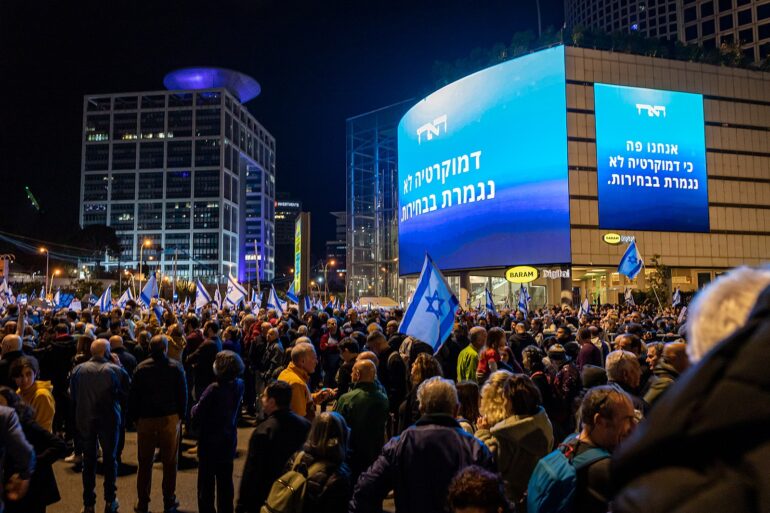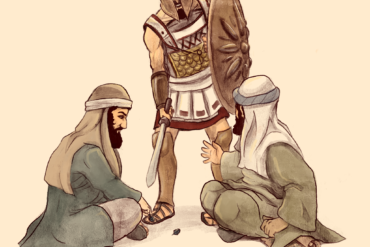While speaking on a panel regarding the government’s judicial reform legislation and “Hebrew law” (the legal theory and judicial precepts developed by Israel’s sages over several generations), Rav Ido Rechnitz made a sharp distinction between the two camps fighting over the future of the State of Israel.
Rather than adopting the lazy, obfuscating language of the press, which tries to paint the sides as “left” and “right,” he referred to a “liberal camp” and a “traditional camp.”
By recognizing the fundamental guiding principle of each side, rather than adopting irrelevant terminology in an ideologically driven attempt to draw parallels between Israeli and Western politics, it becomes far easier to understand and weigh in on the reforms and the broader societal struggle that they represent.
On the one hand, we have the opponents of judicial reform and defenders of the Supreme Court – the liberal camp. This camp has adopted slogans that frame the debate as one between democracy and dictatorship, yet they fail to address the fundamental tension between democracy (the political decision-making on the basis of “one man, one vote”) and liberalism (the curtailing of government to maximize personal freedoms).
This tension is at the forefront of the fiercest debates in the Western world, from issues of gun control to hate speech to abortion. In a liberal democracy, the question is to what degree can the majority enforce its vision for society upon a minority that disagrees.
In such societies, the role of a high court is not to protect democracy – rather it is to limit democracy in order to protect the rights of the individual. In a constitutional democracy, the liberal character of a state is enshrined in its constitution, which forms a basis upon which the judiciary of said society can declare the actions of a democratically elected government unconstitutional, or opposed to the liberal norms agreed upon as the basis for association within the state.
In democratic states without a constitution, by contrast, the judiciary must often apply its own standards for what is reasonable and what is government overreach. When that same court is disproportionately representative of a shrinking minority of the public, the court can become a tool for the minority to retain certain social and economic privileges, against the will of the majority.
From the results of the last elections for Israel’s Knesset, it is clear that the majority of the Israeli public, the democratic sovereign, is interested in a serious judicial reform. Foremost among the proposed reforms is changing the composition of the judicial selection committee.
In the absence of an Israeli constitution, the Israeli public believes that our Supreme Court must be composed of judges who are representative of the populace, in order to ensure that the values guiding judicial review are the values of the people, and not the values of an unelected elite.
And what are those values, if not the celebrated values of Western liberalism?
They were best expressed in Israel’s declaration of independence: “freedom, justice and peace as envisaged by the prophets of Israel.”
Contrary to media depictions, the “traditional camp” – the majority of Israelis that elected the current government and supports the reform – are pro-freedom, pro-justice, and pro-peace. But rather than looking to the United States or Europe to define and manifest these ideals, they draw from the Jewish people’s rich national heritage, almost four thousand years of prophetic revelation, literature and philosophy, politics and economics, to find the answers to the pressing questions of our contemporary reality.
It’s unsurprising that the Israeli public is increasingly uninterested in liberal democracy. While it has maintained its strength largely by warning against the violent excesses of its 20th Century alternatives, the world is again witnessing a rising tide of anti-liberal governments, carrying broad public support in a rejection of the values so dear to the West. It’s a trend reminiscent of the 19th Century collapse of monarchism, which, despite shoring up its strength in the Bourbon Restoration following the defeat of the French Revolution and the liberal democracy that it represented, was unable to maintain long term popularity.
But just as 19th Century democrats had to find new solutions to avoid the excesses of the French Revolution’s fervor, and truly win the world over from the stability and comfort of monarchy to engage in a new political project, so too do those who wish to challenge liberalism today need to present novel alternatives, rather than regurgitating the failed tropes of the previous century.
This is where Israel’s traditional camp has a chance to shine. While not novel in the common sense of the word, the light of Hebrew prophecy has not graced the world in its fullest strength since the reign of Shlomo. Even the second Temple period was merely a faint echo of the glory that existed in the first.
If the leaders of Israel’s traditional camp are able to aim high, and present – first and foremost to the Israeli public – a compelling vision for what a prophetic state could look like, they have the chance to save humanity from the sinking ship of liberalism and to blaze the trail forward to the next stage in human history.






I agree with this thoughtful and insightful analysis and I would like to hear more from this author in the future